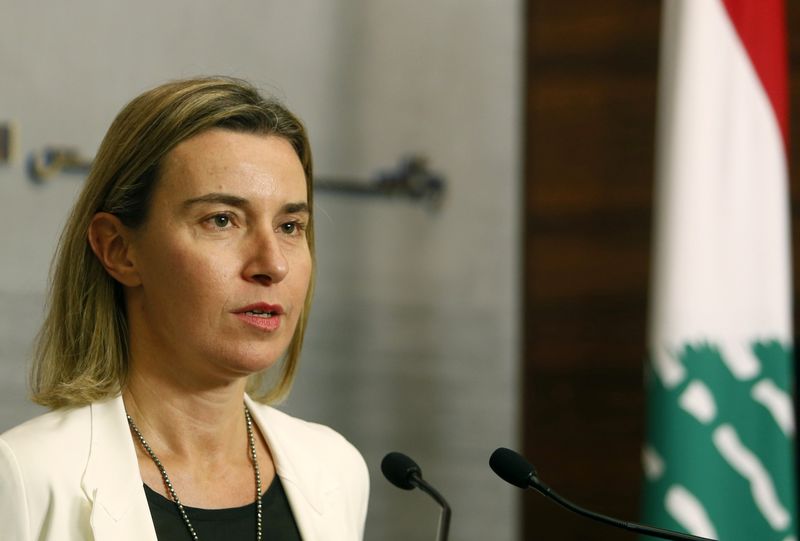By Adrian Croft
BRUSSELS (Reuters) - Italy's Federica Mogherini pledged as European Union foreign policy chief that the EU would play a stronger role in tackling world crises. Her resolve is about to be tested as the bloc debates whether it is time to mend its relationship with Russia.
A year after Ukraine's former President Viktor Yanukovich backed out of an EU trade deal and lit the ongoing crisis, the EU's new top diplomat must steer senior officials to a decision whether to keep up strong pressure on Moscow or "re-engage."
Mogherini travels to Kiev on Tuesday for talks with President Petro Poroshenko, then attends Thursday's EU summit - new European Council President Donald Tusk's first - where Ukraine will be high on the agenda. Foreign ministers then formally discuss the EU's relationship with Russia in January, though behind-the-scenes talks have already started.
Ex-communist EU states worried about Russia initially blocked Mogherini's nomination for the EU role because she was foreign minister for Italy, which expressed reluctance to impose sanctions. She was accepted only when the top job went to Tusk, the former Polish prime minister who takes a much tougher line.
Since then Mogherini has won mainly praise from EU governments but is still under scrutiny. Moscow's annexation of Crimea and support for pro-Russian rebels in eastern Ukraine has driven relations with the EU to their lowest ebb since the Cold War and led the EU to impose economic sanctions on Russia.
With Moscow showing no sign of reversing its decisions, Mogherini must tread a fine line between EU governments such as the Baltics, Poland and Britain which back tough sanctions on Russia and those such as Italy, Cyprus, Greece and Bulgaria that are skeptical about them.
Speaking after chairing her first EU foreign ministers' meeting last month, Mogherini said the talks focused on "how to re-engage in a dialogue - given that Russia is for sure part of the problem but it is also for sure part of ... the possible solution to the crisis."
Mogherini, who says she does not see sanctions as an end in themselves, is ready for personal diplomacy to try to end the Ukraine conflict and restart dialogue with Russia.
She has said she is prepared to travel to Moscow if conditions are right for progress in the matter: Diplomats suggest that could happen early next year.
SUSPICIOUS
Russia is important to the 28-nation EU not only because it is the bloc's leading energy supplier but also because of its influence on issues such as Syria or Iran's nuclear program.
Buffeted by sanctions, a slumping rouble and a falling oil price that are badly hurting its economy, the country has sent informal signals it wants to start re-engaging with the EU, diplomats say.
Moscow has suggested starting a dialogue between the EU and the Moscow-led Eurasian Economic Union, which also includes Belarus and Kazakhstan, as a way to address Russian concerns over the EU's free trade agreement with Ukraine -- now signed but not yet implemented.
German Foreign Minister Frank-Walter Steinmeier backs that idea as a way to ease tensions.
But some others in the EU strongly oppose it, saying it would enable Russia to talk to the EU about Ukraine above Kiev's head. EU governments in eastern Europe particularly are suspicious of any attempt to "re-set" relations with Moscow.
One diplomat said Crimea was "the elephant in the room" and the EU could not simply set it aside and continue business as usual with Russia in other areas.
"It doesn't seem they are really interested in having good relations. Why should we (make) any more concessions?" he said.
SCRUTINY
Mogherini's statements are closely scrutinized by Kiev for any signs the EU position on Russia may be weakening. Her decision to choose a spokeswoman whose husband is a partner in a firm lobbying for Russian energy giant Gazprom caused dismay and much coverage in Ukraine's media.
In Brussels however she has won praise for her energy, grasp of the issues and media skills.
Some EU diplomats contrast Mogherini favorably with her predecessor, Britain's Catherine Ashton, who they say was content to leave Middle East peace-making to the United States and failed to play an active enough role on Ukraine.
"She (Mogherini) has, early on, sent a message that she wants the EU to increase its direct role in the major crises and that frankly was a criticism ... of her predecessor's approach," another EU diplomat said.

Mogherini also wants the EU to play a leading role in trying to restart Israeli-Palestinian peace talks after the U.S.-brokered process foundered in April. She visited the region within days of starting her new job.
(Additional reporting by Alastair Macdonald and Robin Emmott in Brussels, Paul Taylor in Paris, Gabriela Baczynska in Moscow and Sabine Siebold in Berlin; Editing by Sophie Walker)